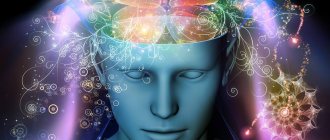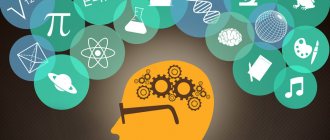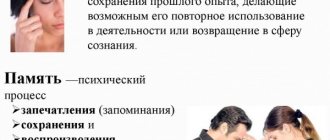The newspaper editor was furious - his young employee left the meeting, defiantly without writing down a single line from the verbose and multi-point instructions dictated by the editor at the meeting. Calling the careless intern on the carpet, he tried to reprimand him. However, he had to be quite surprised when all his instructions were literally reproduced point by point by Solomon Shereshevsky from memory.
He had a phenomenal memory, so much so that he became the object of scientific study by psychologist Alexander Luria for 30 years, after which the scientist refused to find the limits of his memory - there were none!
The secret of his abilities was synesthesia - when the senses interact together, which most inhabitants of the Earth do not have. As a result, his sensory memory transferred information to the short-term, and that to the long-term with incredible strength.
Not everyone is able to remember this way, but you can improve your short-term memory by doing exercises.
Short-term memory capacity
This indicator varies from person to person and characterizes a person’s ability to remember incoming information. If you are asked to remember a series of words and then immediately reproduce them, the number of words remembered will be an indicator of the capacity of short-term memory. On average, this value is 7 plus (minus) 2.
So, short-term memory plays an important role in our life:
- Allows you to process information by participating in the thinking process.
- Ensures the functioning of long-term memory, being a “buffer” from which selected important information then enters long-term memory.
Read, write, speak and listen
Most of the information our brain receives is in some form of language. Messages, lectures, conversations and many other everyday aspects of our lives use language.
When we read, write, speak or listen, we process the information we receive. The more we engage in this activity, the faster our brain begins to process it.
In short, when you actively spend time reading, writing, or communicating with others, you understand and retain information better. So what exactly can you do? Start reading more, write a journal and try to communicate more with others.
Development of short-term memory
The development of short-term memory gives us a number of advantages:
- Helps you quickly assess the situation, respond without preparation, improvise, speak and at the same time sketch out a plan of thoughts that you would like to voice.
- Allows you to perceive the material coherently (remember what you just read and connect it with current information).
- Improves reading and reading comprehension skills.
- Helps to better perceive speech by ear.
- Improves math skills.
The list goes on. As a result, improving the level of short-term memory improves our quality of life.
Characteristics
- Volume
As already mentioned, the optimal capacity of an adult’s short-term memory is 7 elements. A slight deviation of ± 2 elements is allowed. At the same time, you need to understand that in this case, a plus is much better than a minus. If this parameter is less than 5, CVP violations are diagnosed, their cause is determined, recommendations for elimination are given (if possible), and treatment is prescribed.
- Filtration
Short-term memory shows a person’s ability to filter out unnecessary information that the world around us is full of. If during a lecture you are distracted by such moments as the color of a friend’s new blouse, the conversation of those sitting behind, music from the street from an open window, the educational material will not be learned, since the storage spaces will be filled with completely different images.
- Transfer to long-term
The volume and accuracy of long-term memory directly depends on short-term memory. If information is poorly encoded and stored in the KVP, it will remain just as deformed in the DVP, and the carrier will not understand this. This explains the constant debate on the topic: “I remember exactly that it was exactly like that” - “No, everything happened differently.” People remember the same event in different ways and consider their own version to be reliable.
Is it possible to develop short-term memory?
It has been proven that by regularly receiving certain loads, the brain is rebuilt in order to achieve maximum efficiency. Thus, while performing n-backward tasks, the volume of short-term memory and the ability to concentrate increases. In addition, there is an increase in indicators of mobile intelligence, i.e. the ability to analyze, think logically and, regardless of existing experience, solve new problems. The indicator of mobile intelligence is decisive in the issue of learning ability; it is an important part of the indicator of the level of intellectual development of a person.
Scientists have proven that the brain is capable of restoring connections lost due to damage and changing its structure under the influence of various factors, both external and internal. This phenomenon is called neuroplasticity. Continuous processes of both destruction and creation of new connections between neurons occur in the brain. Thanks to neuroplasticity, we are able to learn, develop memory, and even restore brain function when it is damaged. It has been proven that brain plasticity is not lost with age. Brain training is often compared to muscle training, and for good reason.
Types of failures
Senile forgetfulness is not a condition that can be ignored. There are criteria by which the disease can be classified:
- by speed - sudden and gradual;
- in terms of coverage – selective and global;
- for events that are forgotten - retrograde (when new knowledge is not absorbed) and anterograde (when it is impossible to remember what was always known);
- by time - short-term and long-term;
- by prevalence - complete and partial.
The visual variety is taken into account separately, when an elderly person loses memory of faces and does not know what to do. He does not recognize relatives and friends, gets nervous and forgets faces. This aggravates the condition and plunges the patient into constant stress and tension. This can lead to nervous exhaustion and rapid development of the disease. Sometimes amnesia provokes depression, hatred of others and other negative processes.
Therefore, you often have to look for a boarding house in which a pensioner will feel comfortable. Comfortable houses of the “Zabota” boarding house network are at your service. There are medical staff and a suitable social circle.
What is the name of the disease memory loss in the elderly?
Sclerosis, short-term clouding of the mind - they can be determined by a doctor who needs to be observed after overcoming the 65-year mark. If you cannot visit regularly, you should contact us at the first unpleasant symptoms and at the very beginning of forgetfulness. At particular risk are those who live separately, when there are no relatives or they live very far away and rarely visit.
Psychological causes of problems
Memory problems do not always provoke physical illnesses. When a retiree becomes lonely, he loses important social skills and feels unwanted and useless. This destroys his personality. Every day the same procedures and actions are repeated, it becomes automatic and fades because these are insignificant events.
In addition, the following can provoke amnesia:
- emotional turmoil;
- negative news;
- constant stress;
- mental illnesses;
- depression;
- intellectual tension;
- depressed state.
Therefore, if an elderly spouse dies in a married couple, then medications that improve memory in older people, such as pills for sclerosis and other memory problems, cannot be avoided. Living alone after a long marriage almost always leads to a sharp deterioration in health. You can't leave a person alone. He should be taken into his home and family or placed in a boarding house, where he will be helped to feel like part of a team.
How to develop short-term memory?
- The brain also needs a “gym”. To develop the cognitive functions of the brain, regular training on online developmental simulators is successfully used. Comprehensive programs for training memory, attention, thinking, and perception help the comprehensive development of cognitive functions.
- Repetition is the mother of learning. By repeating the necessary information to ourselves every 14-16 seconds, we “update the data.”
- Simple and emotional is much better than complex and bland. Simplify the information as much as possible and support it with emotions.
- Motivation is a powerful weapon. Give yourself the mindset that you simply need this information in the future.
- Develop figurative memory. Simple associations and other mnemonic devices help to “tie” the desired word to an image (to a part of the body, to an object in a familiar interior, or by composing an incredible story from words that are not related in meaning). Here are some tips:
- Unusual, rare - it means it will be remembered better. Create vivid images to remember.
- Divide long information into blocks that are easy to remember: for example, dividing a phone number or PIN code into parts associated with memorable dates; you can create images that reinforce a certain combination.
- Look for patterns, principles of organizing material, make connections.
- Use music and rhythm. Music can help with memorization if words (letters, text) that need to be remembered are set to the tune of a familiar melody. So, the English alphabet is remembered well by the song “Chizhik-fawn, where have you been?”
- Use the first letters of words that add up the necessary information: for example, Ivan chopped wood, Varvara lit the stove - the first letters suggest the sequence and names of cases in Russian (nominative and so on).
If we classify memory according to the nature of mental activity, figurative memory deserves special attention. It stores images: smells, sounds, visual ideas. One of the indicators of the individual typological characteristics of memory is the type of memory that is leading for a particular person. In this vein, visual, auditory, olfactory, tactile and other types of memory are distinguished.
Meditate
Important aspects of meditation are learning to control your thoughts and being aware of your surroundings. It also helps clear your brain of negative or unimportant thoughts. So, practicing meditation will help you filter what is important and what is not. Once you have weeded out all the unnecessary information from your brain, important information becomes easy to store.
Meditation is often depicted as an upright posture with folded legs and outstretched arms. However, meditation is not just about posture; it is a technique that can be used anywhere and anytime.
The best way to start practicing meditation is to meditate for a few minutes every day in bed, both before going to bed and when you wake up in the morning. [2]It is easy and simple to practice.
Short-term visual memory
Short-term visual memory is associated with fixation, storage and reproduction of visual images. Its volume is quite easy to test.
Short term memory test:
Draw a 3X4 table and fill it with random two-digit numbers. Look at the table for 20 seconds, trying to remember as many numbers as possible. Then close it and write down all the numbers you remember. The playback order does not matter.
For an adult, the norm is considered to be a level of short-term memory at which at least 7 numbers are remembered.
To train your child’s visual memory, you can use the following game: prepare two pictures with the same object, well known to the child. In the first picture the object should be depicted in its entirety, and in the second it should be missing some elements. For example, in the first picture there is a table, and in the second there is the same table, but without one leg. First, the child is shown the first picture and asked to look at it and remember it (30 seconds). Then the first is removed, the second is given and asked to name the difference (or differences) from the first.
Effective exercises
There are many exercises to improve your memory. They are most often used for children, but also work effectively on adults. But it’s not enough to just know how to improve short-term memory with exercises. You need to exercise regularly, at least 20-30 minutes every day. For the training to take effect forever, 1.5-2 months must pass. Scientists (and you yourself feel it) have already proven that memory needs to be improved; without constant training it gradually deteriorates. To do this, you can use the most popular exercises. It is recommended to perform each of them 5-6 times daily.
- "Fibonacci Technique". It involves mentally naming a certain series of numbers. Each subsequent one is the sum of the previous ones.
- "20 words." You need someone to write 20 unrelated words on a piece of paper. You need to look at them for a minute, you can pronounce them. After that, remember. It is important not only the number of words remembered, but also their order.
- "Paragraph". Open any book at random and read the first paragraph you come across. After this, you need to retell it as close to the text as possible.
- "Pythagorean Technique". In the evening, you need to remember all the events of the day, starting from waking up. Try to reproduce them in detail and in the correct sequence.
- "Making up words." This exercise effectively activates the brain. You need to come up with 10 words for each letter of the alphabet.
You don’t have to set aside separate time for memory training exercises, but do them throughout the day. Pay attention to posters, remember 10 products on a store window, remember a song you heard in the morning. Each has its own effective methods. You can use only one exercise or use all methods. But short-term memory can and should be trained.
Short-term auditory memory
Short-term auditory memory is associated with the fixation, storage and reproduction of auditory images. It is one of the types of figurative memory. Back in 1960, experimental results proved that auditory memory is one of the main conditions for storing and reproducing verbal information (George Sterling, American cognitive psychologist).
There are special tests for short-term memory, methods that allow you to assess the volume of auditory memory, but they are relevant primarily for assessing the level of readiness of a child for learning at school.
To train a child’s auditory and associative memory, you can use the “Describe Me” game. To do this, the adult names an object or animal, and the child must imagine it and name its different types, signs, actions, features, sounds. For example: a kitten is small, warm, fluffy, has long, thick fur, and can purr like this: “Purrr.” It can meow like this: “Meow.”
Adults are advised to learn to listen to the sounds that surround us and are perceived as background. Try to highlight them individually and repeat them mentally, trying to be as precise as possible. This trains both attention and auditory memory.
Online gaming simulators are very effective. Thus, thanks to training on the Zvukvar simulator, the ability to retain sound information improves and an ear for music develops. Regular fifteen-minute sessions bring tangible results.
Violations
Short-term memory problems need to be addressed immediately because they have much more serious consequences than long-term memory problems. When a person does not remember what happened 5 years ago, it is excusable. But when he forgets what he did 5 minutes ago, it turns into a disaster not only for himself, but also significant difficulties for the people around him.
Causes
Loss or damage to short-term memory can be caused by the following factors:
- depression disrupts the chemical and hormonal balance in the brain structures, causing the ability to concentrate to be lost;
- ischemic stroke leads to problems with cerebral circulation;
- mental trauma: the central nervous system blocks the storage of painful information, which is associated with a state of affect, when after a severe stressful situation a person does not remember what happened in those few minutes;
- head injuries lead to a temporary deterioration of the CV;
- Drug addiction, alcoholism, and smoking do not allow the brain to receive the required amount of oxygen, which is why those parts of it that are responsible for the central nervous system suffer.
The disorder can also be caused by vitamin deficiency, uncontrolled or long-term use of powerful medications, insomnia, thyroid problems, Alzheimer's disease, severe infections (HIV, tuberculosis, syphilis) and other physiological factors.
Symptoms
What are some signs that indicate you have problems with short-term memories?
- lack of logic in thinking, confusion of thoughts and consciousness, progressive dementia;
- blurred vision: blurry pictures, circles and spots before the eyes;
- depression;
- decreased cognitive abilities: the processes of perception, learning and thinking are disrupted;
- impaired motor coordination, muscle spasms.
Poor short-term memory leads to problems in learning and significantly reduces the quality of life, so it should be constantly trained and improved. If serious impairments are diagnosed, this can deprive a person of the ability to perform routine work and live their normal life.
Related article: Memory disorders
Short-term memory in a child
Unlike adults, children have a slightly smaller amount of short-term memory (5-6 words, numbers or images). According to scientists, short-term memory develops especially intensively in preschool age: at this time, the foundations for its development are laid. A preschooler, unlike older children and adults, remembers information mechanically, and begins to manage memory with the help of parents and teachers. The state of his memory and his success in learning depend on how correctly the development of the basic mental functions of a preschool child occurred.
Each age has its own characteristics of memory development.
1. From birth to 1 year, motor memory is formed. The child remembers movements, especially those that have a positive result and are emotionally supported.
2. From 1 year to 2 years – the first attempts to recognize loved ones (parents do not count). The nervous system develops, and with it the volume of memory. Walking is mastered, and this mastery provides new important experience. The rudiments of figurative memory begin to form.
3. From 2 to 4 years old, mechanical memorization will prevail. Basic motor skills are being mastered, the foundations of logic are being laid, and more complex words are being memorized.
4. From 4 to 6 years old, the involuntary nature of memorization dominates in children, which does not depend on the volitional efforts and desires of the child. Memorization is associated with activity and depends on its characteristics. What captivated and aroused strong emotions is what was remembered.
The ability to remember is usually assessed by the state of auditory and visual memory, which is determined by the child’s immediate reproduction of what he heard or saw. Sometimes a child’s poor short-term memory is combined with hypertrophied long-term memory, and in this case the child is not able to remember a short sentence, but reproduces in detail events from a long time ago.
Impaired short-term memory in adults can be associated with age, head injuries, certain medications, brain tumors, chronic sleep deprivation, senile dementia, mental disorders, alcohol and drug use. But let’s not forget about the neuroplasticity of the brain, the opportunity to develop your abilities, and the fact that patience and work will grind everything down.
And a few more general tips:
- Get enough sleep;
- Drink enough clean water;
- When memorizing, try to work avoiding irritants;
- Take care of proper nutrition, taking into account the needs of the brain;
- Train your concentration.
- Strong physical activity improves brain nutrition and, accordingly, its function. In particular, memorization.
Good luck in your self-development and enjoy your studies!
Methods to improve memory
Concentration
For information to be remembered, you need to concentrate your attention on it. Often people forget names, phone numbers, faces only because they do not attach importance to it. “It went in one ear and out the other.” The best method to solve the issue is to wake up. It has already been said that many people “dream awake” and act on autopilot. You need to REMEMBER the need to concentrate on an object in order to remember new information.
Object grouping method
Used by most people to remember information. You need to divide it into groups of 2-3 objects. With such volumes it is remembered faster. The method is often used when memorizing long telephone numbers.
Emotions
It has been proven that information accompanied by an emotional outburst is remembered better. Therefore, it is recommended to come up with a story, perhaps a ridiculous one, with which the consequences of forgetting will be associated. For example, to remember that you need to go get a haircut, you can think: “If I don’t get a haircut, I’ll get lice,” and then vividly imagine this process.
Target
Remember yourself at school - “why should I learn this? I will never… blah blah blah…” To better concentrate on what you need to learn, it is recommended to set yourself a specific goal. Without this, the brain will not be able to remember.
Associations
Information must be accompanied by simple and understandable associations. Then less time and effort will be spent on memorizing it. For example, learn a phone number to the accompaniment of your favorite melody. Sing it to music.
Repeat
The repetition method is also effective. Here long-term memory will work more. To remember better, you need to repeat the information several times.
Folk remedies
Today, various folk remedies are known that can improve memory and brain performance. The three most effective recipes are:
- Clover infusion: take dried shamrock heads and crush them. 2 tablespoons of the prepared mixture are brewed with 2 cups of boiling water and left for 2 hours. The finished infusion is filtered. The resulting drink should be drunk 70 milliliters before meals for three months.
- Rowan bark decoction: Rowan bark is crushed. One tablespoon is boiled for 10 minutes over low heat. Then infuse for six hours. This drink should be drunk 1 tablespoon three times a day for a month. The course can be repeated after 3 months.
- Pine buds – before meals in the spring, 4 pine buds are swallowed, this is suitable for improving memory and brain cell function for a long time.
In addition to the above-mentioned folk remedies, you can use juices and infusions from the following plants: blueberries, beets, carrots, horseradish, rowan, mint, sage, calamus, elecampane.
Dried clover flowers can be used to prepare a delicious vodka tincture. To do this, fill a 700 ml jar with dried clover flowers and add vodka, let it brew for 2 weeks, shaking the mixture occasionally. You can drink 1 tablespoon of this tincture before bed.
Another useful remedy is ginseng and eleutherococcus infusion - they are usually prescribed to restore brain function after a hard day at work. It can be used by both adults and adolescents, twice a day as prescribed in the instructions for use.
Memory types
If you are going to train your ability to remember, you need to understand how it works. Based on the time and features of storing moments, memory can be divided into four types:
- Direct. When everything that happens around you is forgotten almost immediately.
- Short-term. Information in this case is not stored for more than 30-40 seconds.
- Long-term. All our memories from childhood, travel or the past are the result of this type of activity.
- Sliding. This is a convenient way to store information for the amount of time we need.
Clinical picture, specific manifestations
The danger of progressive amnesia lies in the difficulty of its early diagnosis, since most symptoms are attributed by relatives and the patient himself to age-related forgetfulness.
What are the main points in human behavior that should alert you:
- the patient forgets where he lives now if the move took place several years or months ago, and repeatedly calls the address where he lived in his youth;
- stops recognizing recent acquaintances - for example, a new doctor or a neighbor in the staircase;
- cannot remember events of the recent past - what he did an hour, a day or a week ago.
At the same time, long-standing professional skills are preserved. The ability to read, write, knit, drive a car, or solve complex equations, if these skills were acquired in youth, remains until the last stage of the disease.
As compensation for the loss of short-term memory, the patient “comes to life” old memories - sometimes from distant youth - and even long-lost skills (for example, the ability to sew, knit, acquired in childhood, but lost later). After some time, these skills are also destroyed.
An important sign of progressive amnesia is a disruption in the process of recognizing loved ones.
The patient understands that the person is familiar to him, but cannot understand exactly who it is, and transfers to him the image of relatives and friends from the distant past:
In severe cases and at a late stage of the disease, a person stops recognizing himself in the mirror and begins to talk to himself. Attention drops, the ability to concentrate on current events disappears completely. The sequence of events in life ceases to be perceived adequately. For example, the patient transfers important moments for him that happened in the distant past to the present - for example, he is going to his graduation at the institute (being a seventy-year-old professor).. Adequate perception of space is destroyed:
Adequate perception of space is destroyed:
- patients cannot see how far away things, houses, people are;
- do not relate objects to each other.
The perception of events becomes fragmented and does not add up to the overall picture, so the patient loses the ability to acquire new skills and create simple logical chains.
In many cases, the patient plunges into early adolescence or childhood, expecting:
- the return from work of his father, who died several decades ago;
- events that happened in my youth - weddings, trips.
Vicarious perception of surrounding people always occurs at a later stage. The patient sees a mother or sister in a daughter or granddaughter, and friends of his youth in the staff.
In the last stages of progressive amnesia, there is an almost complete collapse of the personality, an inability to care for oneself and death from concomitant diseases - tumors, cardiovascular diseases, chronic inflammatory processes.
What signs are not symptoms of this disease?
Short-term memory impairment due to fatigue, natural forgetfulness, which the patient has always had, cannot be considered symptoms of the initial stage of amnesia.
Absent-mindedness, decreased ability to read and write, loss of fine motor skills, attacks of aggression against the background of the inability to perform the simplest action are not signs of memory loss and belong to other diseases - for example, senile dementia.
Symptoms
The main symptom of amnesia is, of course, memory loss itself. A person can forget any things for a short period of time or forever. Even a situation where you can’t find your car keys is a sign of amnesia. There are also a number of other symptoms that can be associated with the causes of this disease. Almost all of them can occur, but often only a few of them appear, and sometimes the person simply becomes very forgetful.
Possible symptoms:
- Confusion. The person has problems with perception, cannot remember important information, and his behavior becomes strange.
- Paramnesia and confabulation appear. This means a distortion of facts and any memories in a person’s head, as well as the presence in memory of false events that never happened. Often accompanied by hallucinations.
- Speech problems. The person speaks slurredly, utters meaningless phrases, or cannot say a word at all.
- Low concentration, impaired brain activity. It is difficult for the patient to concentrate on one specific task and do usual activities.
- Headache. The pain can be periodic, but sometimes does not stop for a very long period. Their strength depends on the root cause.
- Dizziness. The head may feel slightly dizzy, which many people don’t pay attention to at first.
- Lack of orientation in space. The patient does not understand where he is and does not recognize familiar places. At the same time, he completely loses orientation in space.
- Coordination problems. It is difficult for a person to control his body, he often makes mistakes in movements.
- Shiver. A person sometimes suddenly begins to tremble. There are no obvious reasons for trembling.
- Fatigue. Feelings of extreme fatigue can appear at any time of the day or last for several days.
- Bad mood. The patient is not in the mood for positive communication; he has a complete lack of interest in what is happening around him.
All these symptoms are signs of either the root cause of memory loss, i.e. underlying disease, or progressive amnesia, which can lead to serious problems. Both cases require medical intervention, because can cause a person to be intellectually disabled, completely lose their memory, and experience serious complications.
What it is
Temporary memory loss is called transient (or transient) global amnesia. Usually occurs unexpectedly. This even throws some people into panic. Agree, it is difficult to come to terms with the fact that a young, healthy man in a leadership position completely forgets about a serious report or event that everyone in his company knows and remembers. It’s even worse when you find yourself in complete prostration, you don’t understand where you are and who you are. “Lost” elements can be different: from a name and residential address to small events (meeting, conversation, acquaintance).
This kind of memory loss is called short-term because it lasts for a short period of time. For example, after waking up, you can freeze in prostration for a few seconds. But, as a rule, after looking around, a person quickly comes to his senses, realizes that he is at home, and calms down.
Sometimes memory loss occurs for a few minutes: we forget why we came to the store (to a neighbor, just to another room). Having concentrated, we return everything to normal and remember what exactly we need to buy, ask or take.
In rare cases, it can last several hours. To restore it, you usually have to talk to other eyewitnesses of forgotten events, who help recreate their course, or play some recordings. Sometimes she revives on her own.
The frequency of short-term memory loss is also unpredictable. Some people experience this only once in their entire life. Some - several times a year. But there are those who suffer from such failures much more often. No specialist can tell you with 100% certainty whether this can happen again in a particular case.
Short-term memory loss should not be treated as an accident. Most often, it either becomes the result of serious disorders in the psyche or brain structures, or itself causes irreversible consequences in them.
Causes of Memory Loss
All the reasons that provoke the occurrence of memory lapses can be divided into two categories, namely physiological and psychological reasons.
Physiological factors include: injuries, chronic diseases (for example, cardiovascular diseases), various disorders in the brain and disorders of the functioning of the nervous system. Also, this disorder arises as a result of regular lack of sleep, a sedentary lifestyle, improper metabolism, non-compliance with diet, and disruptions in the blood circulation system.
Psychological factors include: daily stressful situations, constant fatigue, lack of attention, expansive states (lethargy or agitation), excessive thoughtfulness. As a result of these factors, the individual switches to mechanical performance of certain essential operations, and they are not remembered at all.
Short-term memory loss can be a manifestation of many different disorders. And the cause of its occurrence is depressive conditions, infectious diseases, various injuries, side effects from the abuse of alcoholic beverages or drugs, taking certain medications, and dyslexia. Among the most common factors that provoke this disorder are: alcoholism, brain tumors, Alzheimer's, Creutzfeldt-Jakob and Parkinson's disease, depressive states, stroke, meningitis, human immunodeficiency virus, epilepsy and marasmus.
Also, the interaction of certain medications can cause short-term memory loss, for example, the simultaneous use of Imipramine and Baclofen.
In addition, short-term memory loss can occur due to neurodegenerative diseases, cerebrovascular disorders, skull injuries, normal pressure hydrocephalus, sleep disorders, thyroid pathologies, mental disorders, Wilson's disease.
Short-term amnesia, in turn, can be triggered by a hormonal disorder. Some female representatives of the population may experience cases of short-term amnesia during menopause.
Partial memory loss is a so-called malfunction in the functioning of the brain, characterized by a disorder of spatio-temporal indicators, the integrity of memories and their sequence.
The most common factor provoking partial amnesia is considered to be a dissociative fugue or the state of an individual after a change of residence. For example, partial amnesia may occur as a result of an individual moving to another city. At the same time, events that range from a couple of minutes to several years ago may disappear from memory.
The second cause of this form is considered to be severe mental trauma or shock. The subject loses some biographical information from memory, which triggers negative memories.
In addition, partial amnesia can occur due to the effect of hypnosis on an individual. An individual may not remember what happened to him during hypnotic influence.
Senile memory loss is observed accordingly in older individuals. However, it cannot be considered solely a consequence of age-related changes. More often, senile amnesia occurs due to the lifestyle of individuals. Also, the causes of this form of the disease can be: metabolic disorders, infectious diseases, traumatic brain injuries, poisoning and various brain pathologies.
Memory loss in young people can occur due to chronic lack of sleep or sleep disturbances, lack of vitamin B12 and regular exposure to stress. Young people can also experience memory loss after stress. Often, as a result of suffering a severe emotional shock, young individuals can completely forget all data about themselves.











